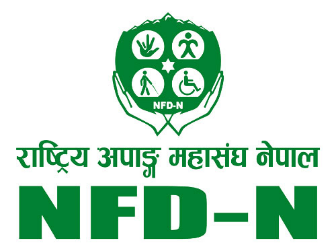Employment for persons with disabilities: a discussion on barriers, achievements and opportunities
This article is written by Mr. Sagar Prasai.
Download this article in Accessible PDF format.
Background:
Everybody wants job. Similar is the case in disability community. Every persons with disability wants to get a job. But many of them are still unclear what is the job they would like to do is. Even if some of them can tell- they want to work in bank or be a newspaper editor, they don’t know the skills and qualification that particular jobs will need. They apply for any job that is available and mostly are rejected. This has caused a lot of frustration in the people with disabilities because of the thinking that the only reason they are not getting jobs are because they are disabled. That may be true to some extent but the reason is not only that.
People with disabilities are not getting jobs because of two major reasons- First, employers doesn’t know there are skilled manpower within disability community and are also afraid to hire persons with disabilities. Second persons with disability doesn’t know what is needed to apply for a certain job. This is a huge gap between the employers and job seeker. However, if the employers get to know qualified and skilled manpower in disability community and if people will disability know what they want to do and know what is needed to do that job, this gap will be gone.
Global Context:
The situation of employment of persons with disabilities is somewhat similar around the world. They are not getting enough employment opportunities and those who are employed are also paid lower wages in most cases. According to Bureau of Labor Statistics in USA, only 17.5 percent of persons with a disability were employed while 65% of persons without disabilities were employed in 2015. Similarly, the unemployment rate for persons with disability was 10.7 percent in 2015, about twice that of those with no disability (5.1 percent).
World Report on Disability (WHO, World Bank, 2011) also shows contrasting difference in employment rate between persons with and without disability. This report shows that in low income countries, employment rate of persons with disabilities is 42.9% while that of people without disabilities is 58.8% (in age group 18-49 yrs). The report suggest four major barriers for employment of persons with disabilities: Lack of Access, Misconception about Disability, Discrimination and Overprotection in Employment Law. It is also seen that women with disabilities earn less than men with disabilities.
Nepal’s Context
According to the National Population Census of Nepal (2011). 1.94% of total population has disability. That equals to about 500,000 Nepalese. Out of those people, 163000 (1.52% of total youth population) are youths between (aged 16 -40). There are not any desegregated data on disability and employment. However, based on the field experience, we can safely say that employment status of people with disabilities in Nepal is in its worst case.
Very few people with disabilities are employed and even among them, most are unemployed. National Living Condition of Persons with Disabilities (National Federation of the Disabled – Nepal and SINTEF, 2015) states that access to employment among persons with disabilities is very low. This is similar even for the households with family members with disabilities.
Because of various myths about disability, it is seen that people with disabilities can do only certain kind of jobs. For instance, it is believed that, persons with visual impairment can only do front desk jobs or teaching jobs. These kinds of presumptions has also played significant negative role in employment of persons with disabilities.
However, there are also some big companies that have set a strong examples by hiring persons with disabilities. Those companies include- Deurali Janta Pharmaceuticals, The Bakery Café, Cloud Factory etc.
Government Provisions
The new constitution of Nepal which was adopted a year ago has prohibited discrimination of any kind because of one’s disability. This is applied in employment sector also. In addition to that, Disabled Protection and Welfare Act (1992) has stated that every private company that hires more than 25 employees should hire at least one persons with disabilities for every 25 employees. The pay and other facilities of these employee with disabilities should be equal to those without disability. However, these laws are not implemented in way they are mandatory.
Nepal government has also reserved 5% quota in civil service jobs (public service). This provision has help many people with disabilities to get into government jobs each year. Similar provisions are in place for jobs that are opened by companies and commission that haves some kind of government investments.
Government also has provision for disability pensions and allowances if somebody acquired a disability during jobs. But there are no such provision in terms of private companies.
Right vs. Skills
Employment like other basic needs are rights of every persons. However, by being focused only on employment rights, many job seekers with disabilities have given very little of no emphasis on individual’s skill sets. It is very important on someone looking for a job to have the minimum requirements and skills that are required by that particular job. But many times disability rights activists themselves try to overlook this fact and private sector are often unhappy with this.
The skills development training provided by NGO are often traditional and doesn’t provide the necessary skills to the participants so that they can integrate into mainstream labour market. This is because these trainings package are designed without doing necessary market assessments.
Employers are also hesitant to hire persons with disabilities thinking that once hired they can’t be laid off the jobs ever. So disability activists should pass on the message to the private sector that firing someone because of disability is prohibited, but firing someone because of bad work is okay.
Also job seekers with disabilities should be prepared for the job market they are about to enter. They should also leave behind the ‘NGO culture’ and become more professional as they are expected during the job.
Opportunities and Conclusion
Even though employment situation of persons with disabilities is not satisfactory currently, many initiatives are underway which promises the good outcomes in the future. Because of the new constitution, many acts are being revised including employment law of Nepal, so this is the best time for activists in Nepal to intervene in such acts to make them disability friendly as well.
Many employers have now understood that people with disabilities may be their reliable work force. People with disabilities should be able to take this belief in next level by preparing themselves for jobs they have to offer. NGOs can also help in this process by providing trainings of those skills which are easily sellable in Job Market. A through market analysis needs to be done while designing such trainings.
Disability community of Nepal can also be benefitted from the many years of relation between Nepal and Republic of Korea. Bringing good practices on disability and employment from Korea to Nepal by engaging professionals and civil society organizations of both countries will play a significant role in employment of persons with disabilities. Sharing what is working on each country and what are the factors that are motivating private sector to work closely with disability community will also be very important.
A society will only be equal and just if it’s all members have equal opportunities and participation on social, cultural and economic activities. Having jobs is important to everybody and it is more so for people with disabilities to become independent. If disability community works with private sectors not lobbies for job not only because it’s our rights but because we have skills approach then creating a just society is possible.
Download this article in Accessible PDF format.
About the Author
 Mr. Sagar Prasai works as a project coordinator at National Federation of the Disabled-Nepal. He specifically works as project lead for implementing employment related activities at NFDN. He has experience of working both with employers and job seekers with disabilities and this article is result of such interaction with both parties during his work.
Mr. Sagar Prasai works as a project coordinator at National Federation of the Disabled-Nepal. He specifically works as project lead for implementing employment related activities at NFDN. He has experience of working both with employers and job seekers with disabilities and this article is result of such interaction with both parties during his work.
Mr. Prasai can be reached at aware@nfdn.org.np or sagar.prasain@gmail.com

